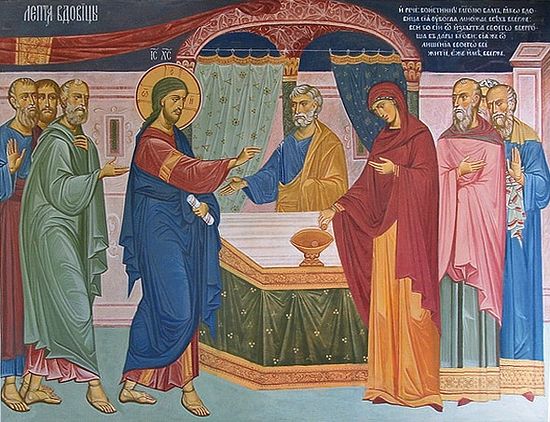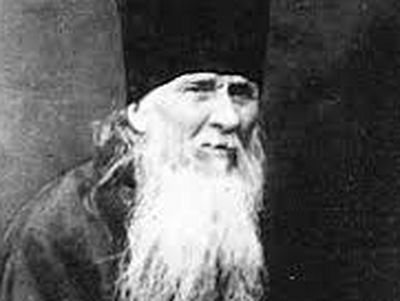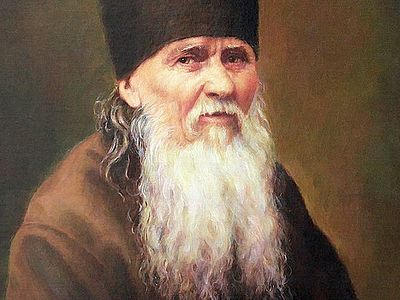During the fast leading up to the Nativity of Christ, Christians are reminded once again of their duty to take a look around them and give what they can to relieve the needs of others. Here is some advice from the Optina Elders on almsgiving.
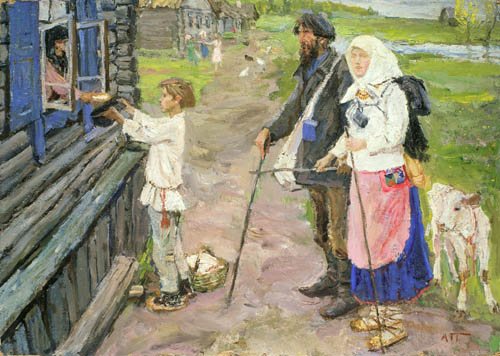 Blind People. Artist: A. Plastov
Blind People. Artist: A. Plastov
The most favorable time for giving alms is during the fasts. The Optina Elders often reminded people about almsgiving and charity.
“Blessed are the merciful”
St. Leo taught people to be merciful, and reminded them of the words of the Gospel: Blessed are the merciful, for they shall obtain mercy (Mt. 5:7).
St. Anthony wrote:
“It is said, Blessed is the man who shows mercy to his cattle, but a thousand times more blessed is he who takes on beggars, the poor and the lame—as if they were giving him, himself, to drink and setting his mind at ease.”
The Elder reminded people that for every stranger or poor person to whom they give alms, the Lord would show His mercy:
“Make a note of this, that, no matter how many strangers and poor have been in your blessed house, for each one of them you will receive a sack—that is, rich mercy from the Lord… The Kingdom of God will be yours!”
Alms according to one’s strength and means
St. Joseph taught people to give alms according to their strength and means:
“Giving … alms to the needy ought to be according to one’s strength and means. St. Barsanuphius the Great says, ‘If someone doesn’t give a needy person the thing that he himself most needs, he does not sin.’”
“By Thy blessing, Lord, have I done this.”
Elder Nektary reminded people about the fact that we must not be proud of our almsgiving, but rather give thanks to God Who made it possible for us to help somebody in need:
“If someone manages to do some good deed or to give alms, say, ‘By Thy blessing, O Lord, have I done this’—for Without Me ye can do nothing (Jn. 15:5).”
Leave it to God’s Providence
St. Ambrose taught that if we have given alms, we should not “trust the thought that our money will be used in the wrong way.”
“There are two types of charity: The first, to give charity to one’s own soul by pious deeds with humility and without judging others, so as not to expose oneself to what the Pharisee exposed himself to; and the second, giving outward charity with outward means, which likewise brings profit to our soul, if we do not judge and do not trust the thought that supposedly the alms are being used in the wrong way.”
“It is most beneficial of all to give charity and to believe without doubting that we will receive a reward from the Lord for this, as the Prophet Daniel said, The ransom of a man’s life are his riches; and in another place: By alms and faith sins are sins purged away.”
We shouldn’t worry about how our donation is used, but rather leave it to God’s Providence.
“You expressed more than once in your letters that you wish to be a true Christian. But the apostle writes about true Christians, that they received the robbery of their possessions with joy. But we, feeble ones, at least should not grieve too much over [alms] received imperfectly, and especially should not worry about whether the sum donated by us was rightly or wrongly used. Now it seems to be wrongly used, but it’s possible that later it will be said that it was used very suitably,” wrote the Elder to one of his spiritual children.
Sometimes well-dressed people ask alms, who from our point of view do not need any money. But we can never know why this person is asking our help and how much he is actually in need. Therefore St. Ambrose used to remind people of the words of St. Dimitri of Rostov:
“St. Dimitri of Rostov writes, ‘If a person comes to you on a horsei and asks you for money, give it to him. You aren’t responsible for how he uses your alms.’”
Is there a difference in deeds of charity?
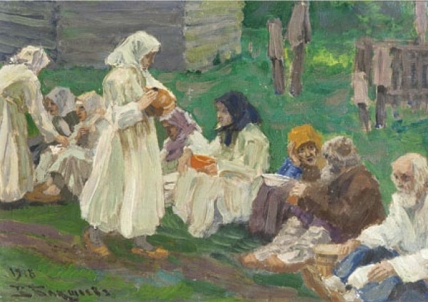 V. Baksheev. Alms. 1918.
V. Baksheev. Alms. 1918.
St. Ambrose explained that in a good deed such as charity, there can be a distinction. The starets put charity rendered to monasteries above all:
“When I had occasion to enter into a more detailed investigation of spiritual things, I found that there is a great deal of difference. You can do something beneficial for thirtyfold, but better for sixtyfold—but a hundredfold is even better, and more beneficial, and more unto salvation.”
“If the head of the prostitutes, as it says in the stories of the elders, was placed higher than St. Macarius the Great only for the fact that he found a way to preserve thirty nuns from being defiled, replacing them with women who had been under his command, then what kind of reward do you think a person might receive who gives a hundred virgins gathered in a convent to serve God the chance not to be dispersed to various places or go back to the world?”
“It is good to help people whose home has burned down, but in this case there is only sorrow, which for the most part brings benefit to people, for which purpose a fire is allowed from Providence above; but it’s a hundred times higher to preserve many or give a chance to many to be preserved from manifest spiritual harm.”
Elder Ambrose wrote to his spiritual child that “to build a monastery, in which many would be saved before the coming of Christ” was the work most pleasing to God:
“There is a big difference between giving to poor laypeople or using this sum to build a monastery in which many will be saved before the coming of Christ. There is a great difference between a one-time good and a good that is permanently profitable, as the Lord Himself declares in the Holy Gospel these different degrees of thirtyfold, sixtyfold, and a hundredfold.”
i A sign of wealth in those times.
